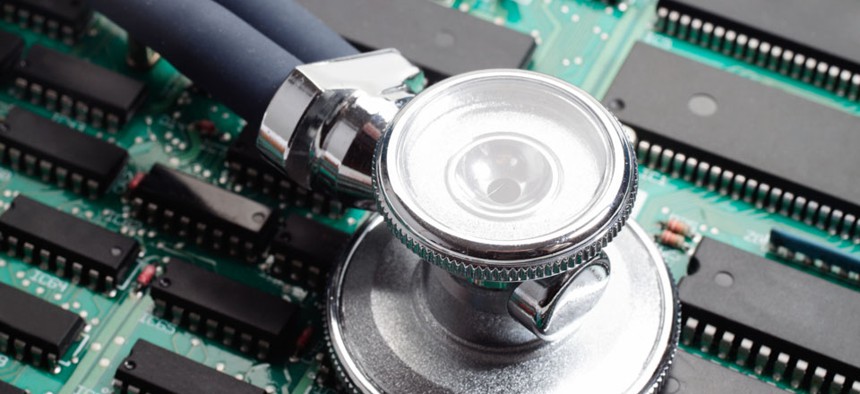The Case for Computer-Based Health Care

Slawomir Fajer/Shutterstock.com
Doctors would still need to reassure and coach patients.
The victory of Watson, an artificial-intelligence system designed to dominate the quiz show Jeopardy!, over the country's best nerds in 2011 may not be the equal of John Henry struggling against a steam-powered drill in the annals of man versus machine. But the replacement of Jeopardy!'s human competitors with a computer algorithm may signal a trend that could soon spread through the health care sector as Obamacare is implemented.
That's the prophecy of venture capitalist Vinod Khosla. The prominent Silicon Valley investor has predicted that computers will replace 80 percent of what doctors do in a couple of decades. The shift could counter another health-sector trend: stagnant productivity, which the Affordable Care Act aims to address with financial incentives for effective, efficient care, and which could encourage a move toward digital doctoring.
Between 1990 and 2010, productivity in the health care sector declined by 0.6 percent annually as employment increased by 2.9 percent, according to Robert Kocher, now a venture capitalist at Venrock, in an October 2011 editorial in the New England Journal of Medicine. Increasing productivity might bridge this disconnect, and computers could be part of the solution.
Khosla, who supports the move to computer-based health care, notes the human frailties that weaken doctors' diagnoses and treatment: The brain is biased, forgetful, and limited. As a result, diagnoses are often inconsistent. Khosla cites a study in which psychologists were asked to diagnose patients' major depressive disorder. On a scale where 0 represented total disagreement and 1 represented total agreement, the psychologists rated 0.3.
Human brains take in less data than their digital counterparts. "It's a simple fact that most doctors couldn't possibly read and digest all of the latest 5,000 research articles on heart disease," Khosla writes. "In fact, most of the average doctor's medical knowledge is from when they were in medical school, and cognitive limitations prevent them from remembering the 10,000+ diseases humans can get." As the amount of information increases--there's more research, and more sensors to collect it--digital support processing the data could be a big help.
Khosla predicts that computers will take over large portions of the medical process, leaving humans to do empathic tasks, such as reassuring and coaching patients. The beginnings of that trend are here already. Several start-ups offload doctors' tasks onto computers; EyeNetra, which Khosla has invested in, uses software and a device that attaches to a smartphone to determine the strength of prescription lenses a patient requires.
This summer, the National Institutes of Mental Health funded a round of grants to explore using mobile devices to treat mental health problems. Akili Interactive, a video-game maker that received NIMH funding, combines tasks that require fine motor skills and visual attention. The games "actually become a very sensitive measure of cognition," company cofounder Eddie Martucci said at a May conference. Akili is also hoping to treat major depressives, who tend to struggle with problem solving. Solving problems in a game might condition these patients to better solve problems in real life, without a doctor's intervention.
Other algorithmic software aims to aid physicians' decisions rather than replace them. "Clinical decision support software" analyzes data, often from a patient's electronic health records, and advises doctors as they prescribe a treatment course. The software could note, for example, that two drugs shouldn't be administered together due to their harmful interactions.
Software can also be used to improve doctors' adherence to clinical guidelines. The HealthPartners hospital system in Minnesota found limited success with a software tool that showed doctors how well their order of a scan for a patient stacked up to American College of Radiology guidelines. The tool brought only modest increases in the doctors' ordering of evidence-based scans, according to a study published in theAmerican Journal of Managed Care in 2010, but there were no incentives for the doctors to order more of these appropriate tests. Hospitals could offer more rewards to ensure adherence to best practices.
Health care workers have also started performing empathic tasks based on algorithmic advice. Jeffrey Brenner, executive director of nonprofit Camden Coalition of Healthcare Providers, received a MacArthur Foundation "genius grant" for his approach to delivering better care at lower cost. Brenner sent social workers to certain "hot spots," which were identified by software as places where a small minority of patients consumes a disproportionate amount of health care resources. These patients often have chronic diseases that aren't treated properly, and these patients frequently end up in the hospital. The goal of "hot spotting" is to intervene early before problems flare, making the patient healthier despite using fewer resources. Social workers can assist by forming relationships with patients and helping them manage their illnesses.
Providers are adopting this approach in response to new payment incentives ushered in by the 2010 health reform law, which imposes penalties on hospitals with high readmission rates. Mount Sinai in New York is one institution sending social workers to troubled patients. A 600-patient pilot study cut emergency-room visits in half between September 2010 and May 2012, the hospital says.
So instead of being replaced--what John Henry fought against when he raced the steam drill--health care workers can perhaps work alongside the new computer overlords.
(Image via Slawomir Fajer/Shutterstock.com)





